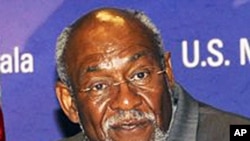The top U.S. diplomat on Africa places blame for the violence in Ivory Coast squarely on the shoulders of Laurent Gbagbo, who refused to accept defeat in last November’s presidential election. The U.N. has declared Alassane Ouattara as the president-elect.
“Gbagbo’s intransigence has exacerbated tensions and provoked violence across the country. He and his ministers have openly threatened the United Nations’ operation, which is charged with protecting civilians who are caught in the crossfire,” said Assistant Secretary of State for African Affairs Johnnie Carson. He spoke Tuesday at the Wilson Center in Washington.
“Hundreds of thousands have been displaced,” he said, “and violence last week probably has pushed the death toll in Ivory Coast to above a thousand people.”
Unlike Libya
Carson said it would be wrong to compare the Ivorian crisis with that of Libya in terms of international response to protect civilians.
“For the past four months," he said, “the United States has been working closely with its African and other international partners to achieve a peaceful outcome of the Ivoirian crisis. A robust international peacekeeping force has been on the ground since 2002, beginning first as an ECOWAS operation and then converting in 2004 to a U.N.-led effort.”
ECOWAS is the Economic Community of West African States.
The State Department official says the peacekeepers prevented a “prolonged, bloody civil war” like those in Sierra Leone and Liberia.
Protect civilians
“We are in regular contact with President Ouattara and with Prime Minister Soro to insist that forces claiming to fight on their behalf refrain from violence against civilians, looting and other excesses. We are heartened by President Ouattara’s and Prime Minister Soro’s clear directives to their forces to maintain the utmost respect for civilian populations and their calls for transparent, international investigations of all reported human rights abuses,” he said.
Over the weekend, it was learned that about 800 civilians had been killed in the western Ivorian town of Duekoue. An investigation is underway. Pro-Ouattara forces have denied responsibility.
Many of the Ivoirian refugees now in neighboring countries are said to be Gbagbo supporters.
Carson says, “We have also raised our concerns about violence committed by the pro-Gbagbo forces that have occurred and alleged in various parts of Ivory Coast. We have made it clear that actors on all sides will be held accountable for war crimes and other atrocities.”
Remember Nigeria
The assistant secretary of state says despite the crises in Ivory Coast, North Africa, the Middle East and Japan, the importance of the upcoming Nigerian elections must not be forgotten. He said the 2011 elections must bear no resemblance to those of 2007, which drew charges of fraud and corruption in the victory of then-president Umar Musa Yar'dua.
On Saturday, the Independent National Electoral Commission [INEC] postponed National Assembly elections for one week due to the “late arrival of result sheets… central to the elections and their integrity.”
“This past weekend, Nigeria was to have held the first of a series of elections that will shape the direction of Africa’s most populous and second largest economy. Nigeria has not had credible national elections since 1993. And overcoming this negative legacy remains a significant challenge,” Carson said.
He said the United States agreed with the delay and praised INEC’s chairman, Professor Attahiru Jega, saying he brings integrity and competence to the position.
“However, as we have seen this past weekend, one man alone cannot overcome significant systemic and logistical challenges. Nor can one person alone turn around and transform a political culture in which stolen elections have become the norm for decades,” he said.
The problems, he said, create the “opportunity for political manipulation. And some politicians have acted in ways to make proper electoral oversight all the more difficult.”
While electoral violence this year is lower than that of 2007, Carson said, “Any election violence is unacceptable. And it casts a dark shadow over the entire electoral process.”
Nigerian President Goodluck Jonathan has vowed the elections will be free and fair.




